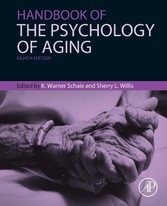Handbook of the Psychology of Aging
von: K Warner Schaie, Sherry Willis
Elsevier Reference Monographs, 2015
ISBN: 9780124115231
Sprache: Englisch
551 Seiten,
Download: 8193 KB
Format: EPUB, PDF, auch als Online-Lesen
eBook anfordern
▸
Preface
K. Warner Schaie and Sherry L. Willis
The Handbook of the Psychology of Aging provides a basic reference source on the behavioral processes of aging for researchers, graduate students, and professionals. It also provides perspectives on the behavioral science of aging for personnel from other disciplines.
The eighth edition of the Handbook continues to reflect both the continuing interest of the scientific community as well as the needs and worldwide growth of the older portion of the population as well as the increase in active life expectancy. The growth of the research literature provides new opportunities to replace chronological age as the primary variable with other variables that represent causal mechanisms and hence present the potential for control or experimental modification. Both academic and public interests have been contributing to the emergence of the psychology of aging as a major subject in universities and research institutions. Issues of interest to the psychology of aging touch upon many features of daily life, from the workplace and family life to public policy matters covering health care, retirement, social security, and pensions.
The psychology of aging is complex and many new questions keep being raised about how behavior is organized and how it changes over the course of life. Results of the markedly increasing number of longitudinal studies are providing new insights into the casual factors in behavior changes associated with adult development and aging. They are contributing to our understanding of the role of behavior changes in relation to biological, health and social interactions. Parallel advances in research methodology particularly directed towards the problems of studying change allow us to explicate in greater detail, patterns and sub-patterns of behavior over the lifespan.
Facing the rapidly accelerating growth of the relevant research literature, the editors once again have had to make choices about what new topics should be included in the handbook. But the growth in research activity does not occur uniformly across all fields. Hence, some topics covered in earlier editions of the Handbook are not included in the present edition. In this edition we have again markedly expanded coverage of the section on Neuroscience, Cognition and Aging. Other new topics first introduced in this edition include: Relationships between adults and their aging parents, intergenerational communication practices, assessment of emotional and personality disorders in older adults, neuropsychological assessment of the dementias of late life, and family caregiving for cognitively or physically frail older adults.
We continue the editorial principle of not inviting previous contributors to revise their earlier contribution. Instead if we felt that a topic needed updating we asked a new author to approach the topic from a different perspective. When a previous contributor reappears in a subsequent edition, it is typically on a different topic that the contributor has developed expertise in. For these reasons, readers are advised to consult earlier volumes of the Handbook, both for data and for interpretations. The previous editions should be consulted for a perspective on the development of the subject matter of the psychology of aging. To assist the reader, Table A present a list of topics (and authors for each topic) across the eight editions of the Handbook.
Table A
Topics and Authors Across the Eight Editions of the Handbook of the Psychology of Aging
| Activity and exercise | | | | Stones & Kozma | | | | |
| Animal memory and learning | | | Woodruff | | | | | |
| Attention processes | | | McDowd & Birren | | Rogers & Fisk | | | |
| Attitudes towards aging | | Rosenmayr | | | | Hess | Hummert | |
| Auditory perception | Corso | Osho et al. | Fozard | Kline & Scialfa | Fozard & Gordon-Salant | | | Winfield & Lash |
| Autobiographical memory | | | | | | Birren & Schroots | | |
| Behavior genetics | Omenn | McClearn & Foch | Plomin & McClearn | Pedersen | McClearn & Vogler | Vogler | Kremen & Lyons | Reynolds & Finkel |
| Biological influences | Shock | | Elias et al. | | | | | |
| Brain and life span in primates | | | | Hakeem et al. | | | | |
| Clinical assessment | Schaie & Schaie | Zarit et al. | Kaszniak | | | | Manley et al. | |
| Cognitive neuroscience | | | | | | | Kramer et al. | |
| Cognitive intervention | | | | | Willis | | Stine-Morrow & Basak | Willis & Belleville |
| Creativity and wisdom | | | Simonton | | Sternberg & Lubart | Brugman | Ardelt | |
| Culture and ethnicity | Guttman | Fry | Jackson et al. | | | | Whitfield et al. | Fung & Jiang |
| Death and dying | Kastenbaum | | Berg | Lawton | | | | Biak |
| Decision making | | | | | | | Peters | Marson et al. |
| Disability and rehabilitation | Kemp | | | | | | | |
| Ecology of aging | Scheidt & Windley | | Parmelee & Lawton | Wahl | | Scheidt & Windley | | |
| Educational psychology | | Willis | | | | | | |
| Electrophysiology of aging | | | Prinz et al. | | | | | |
| Elder abuse and victimization | | | | Wilbur & McNeilly | | | | |
| Emotion and affect | | Schulz | | Fillip | | | Charles | |
| Ethical issues | | | Kimmel & Moody | | | | Moye et al. | |
| Exercise and cognition | | | | | | | | Erickson & Liu-Ambrose |
| Executive functions | | | | | | | | Reuter-Lorenz et al. |
| Experimental principles | Birren & Renner | Birren & Cunningham | | | | | | |
| Family in late life | | Aizenberg &... |











